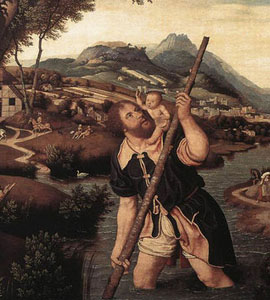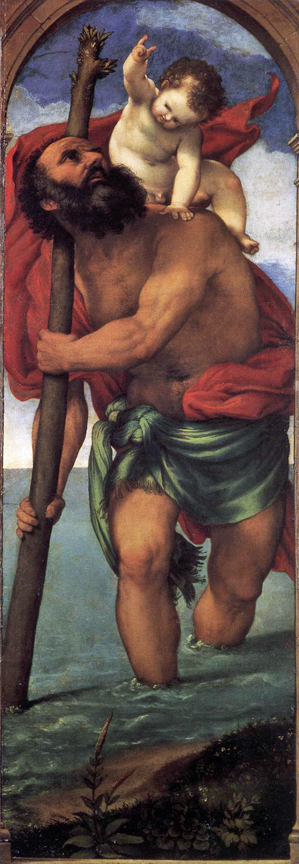New Ark United Church of Christ, Newark, DE
June 29, 2014

He didn’t even have a name when he was found as an infant on the steps of the Abbey of St. Ambrose nestled in the mountains of Switzerland. So Brother Justin named him Columbo, after the Irish missionary who brought Christianity to Switzerland and because Columbo meant dove, the gentle bird of peace. Brother Justin could tell by his big bones and large hands and feet that Columbo would grow to be a huge man.
Columbo indeed grew to a lumbering size but he was also slow of mind and speech. Because his body was growing so fast, Columbo was often clumsy and would frequently break the eggs he was sent to gather every morning. So he was given the job of carrying firewood, for he could carry three times as much as one of the monks. And when he was old enough to wield an ax, Columbo split the firewood as well.
But in many other ways Columbo had difficulty fitting in at the Abbey. His singing in worship was so off-key that the monks suggested that he go sing with the birds, which Columbo took to heart. The other boys at the Abbey made fun of Columbo because of his large size, clumsiness, and slow wit.
The place where Columbo fit in best was with the animals. One in particular, a white ox named Ben, would follow Columbo wherever he went, as if it were a pet dog. That winter the other ox died of sickness. In the spring there was plowing to be done but the monks only had Ben. Columbo volunteered to plow beside Ben, taking up the other side of the yoke. That summer Columbo used his tremendous strength to save Ben from sinking in quicksand at the edge of a bog. Word of his strength spread. An abbot from France came to visit St. Ambrose to meet the famous strongman of the Abbey. When he went to meet him, the abbot found Columbo in the barn playing with a nestful of mice and laughing.
Though Columbo was now considered one of the holiest monks at the Abbey because of his simple way of understanding, the other monks still had trouble finding meaningful work for Columbo that he could do on his own. He still chopped and carried the firewood but this was not enough. An idea came to Brother Justin. Every year many pilgrims came to St. Ambrose on their way to Rome or the Holy Land. To get to the Abbey they had to cross a river, wading through sometimes treacherous waters. Columbo was given the task of carrying the pilgrims on his back across the river. He was delighted with the job.
One night Columbo was called the edge of the river, which had risen considerably with the melting spring snow. He crossed to the other side to find a small child waiting by himself. He reassured the child that everything would be alright, put him on his shoulders, and started across the river. With every step that Columbo took, a great weight began to press upon him. He gasped for breath, his heart pounding. His knees began shaking as the weight grew heavier and heavier. He feared his knees would buckle under him, not for himself but for the child he carried on his shoulders. He went slowly, placing his feet firmly on the stones at the bottom of the river before taking another step. As he neared the other side, the weight became lighter until it was gone. Brother Columbo gently placed the child down and sank to the ground. Brother Justin, who had been waiting on the other side with a lantern, came running to help.

Bewildered, both monks turned toward the child. He was almost glowing, a circle of light around his head. Brother Justin gasped, “It is the Christ-child!” The child said to Columbo, “For what must have seemed like an eternity to you, dear Columbo, you bore the weight of the world’s sin and grief on your shoulders, that which I bear all the time, for the suffering of the world is also my suffering.” Brother Columbo asked, “Lord, why choose me? I am big and slow and can’t do anything right.” The child said, “That is not what matters most. What matters most is love and not thinking of oneself first all the time. Whenever there is suffering you reach out in love, which lightens the burden that I carry. From now on you will be known as ‘Christopher’, which means ‘the Christ-bearer’.”
The child blessed Columbo and Brother Justin, then smiling brightly he walked into the night, the light fading until he could be seen no more. When news of this miracle reached Rome, a delegation was sent to learn all the details of the story. Columbo was later declared St. Christopher, patron saint of all travelers.
Brother Columbo was a slave of righteousness, as the apostle Paul put it. He was willing to bear the burden of love for others. But sometimes it is difficult for our 21st century minds to think of ourselves as slaves. In Paul’s way of thinking we are slaves to one master or another. We think we are masters of our own destiny, that we choose what we will do, what we will say, where we will go, what we will believe. “I am the master of my fate. I am the captain of my soul.” But we are always looking for guidance of some kind. And we have also been conditioned so well by culture, parents, friends, religion, hungers, desires, education, our past, our emotions, and so many other factors that we don’t even realize that some of our choosing is a conditioned reflex, a habit, an addiction. We may think we are hungry when really what we are feeling is empty. We may think we are justified, or righteous, in our opinions or feelings or beliefs but they aren’t any more valid than the next person’s. We may think we can’t change the course of our lives when really what we fear is the unknown.
We are all slaves to something. We all submit to different lordships of different kinds. Money is a master we’d rather not talk about in church, and just by that attitude, money maintains its lordship over us. Fear of failure, that little voice in our heads that tells us we can’t do something or that we have to be perfect, is another. The church is slave to many masters, not just the one we proclaim: our history, the way we’ve always done things, our tradition, and many others. Some of these are good things, like history and tradition, but when we give them power over us, they then take pride-of-place over our primary faithfulness and obedience to Christ and this is what constitutes our slavery to sin.
The hymn “O Master, Let Me Walk with Thee” was changed to “O Savior, Let Me Walk with You” in the New Century Hymnal precisely because we have difficulty with the idea that Christ is our Lord and Master. Such masculine, heavy-handed terms rankle our sense of righteousness and equity. But this is not our sense of righteousness we’re talking about but God’s. Perhaps if Jesus had been a woman we would call her our Lady and Mistress, but regretfully these carry little weight and power. Yes, Jesus is our Savior, but we are saved from our sin when we acknowledge the mystery that Jesus, crucified and risen from the dead, is our Lord. Naming Christ as our Lord and Master is as subversive as it was 2000 years ago, as it was 150 years ago. Plantation slaves were required to call their owners by these titles but worshiped Christ as their true Lord and Master, being his slaves rather than slaves to an evil system created by human beings.

We who are slaves to so many things, we too need the subversive power of calling Christ our Lord and Master. We who have difficulty with surrender and obedience and submission, though we do it everyday with other lordships, need to be reminded that we are slaves but for Christ, the One for whom we bear the burden of love for others. When we realize who we are and whose we are, our lives are never the same. One example that sets this so clearly is when we become parents. Before, we were a couple who could eat dinner at any hour, go away for the weekend when we chose, spend money more freely, work long hours, not have our sleep or anything else interrupted, and so on. But when that baby arrives everything changes in an instant. I remember the exact moment it hit me. It wasn’t until the middle of the night in the hospital, when David and I were asleep with our baby Andrea between us. She woke up crying, needing her diaper changed. I was awake immediately and went straight to it. It was then I realized that love requires more of us than we will ever understand, that love will continue to require even more of us as time goes on.
Hear these words by poet Ellen Bass in her poem to her daughter Sara on her 21st birthday:
When they laid you in the crook
of my arms like a bouquet and I looked
into your eyes, dark bits of evening sky,
I thought, of course this is you,
like a person who has never seen the sea
can recognize it instantly.
They pulled you from me like a cork
and all the love flowed out. I adored you
with the squandering passion of spring
that shoots green from every pore.
You dug me out like a well. You lit
the deadwood of my heart. You pinned me
to the earth with the points of stars.
I was sure that kind of love would be
enough. I thought I was your mother.
How could I have known that over and over
you would crack the sky like lightning,
illuminating all my fears, my weaknesses, my sins.
Massive the burden this flesh
must learn to bear, like mules of love.
Thirty-five years ago there were those of you willing to take on more, willing to love more than perhaps you thought was humanly possible, by starting this church. And this happens to us in many other ways: in marriage, in friendship, in loving our parents, in our work, in our giving and serving. As Christians, though, it is Jesus who requires the most of us in all of these and much more. When we are set free from our slavery to sin we can then choose willingly, joyfully to be a mule of love, to be a slave of righteousness, to bear the burden of love for others. We become a slave to our true nature, which is love, and Christ who is the Lord of love.

But sometimes being free from our prison of sin, with its own set of habits and routines, it can be difficult to shift to life-giving habits and routines. We can be so accustomed to a way of life, even one that is painful, that we find it difficult to change. Sometimes our master’s voice can be annoying, intruding, challenging—at times a downright pest. Like a child who asks for a cup of water for the umpteenth time, Christ calls us to put ourselves aside and to offer ourselves up to what is needed of us, even demanded of us.
How is Christ calling us, the New Ark, to be slaves of righteousness, to be mules of love? What burden of love are we being called to carry on behalf of others, others who may not be a part of this church? What might be preventing us from carrying that burden of love?
How could we have known that over and over Christ would crack the sky like lightning, illuminating all our fears, all our weaknesses, all our sins? Massive the burden this flesh must learn to bear, like mules of love. Thanks be to God, for this burden of love we bear for the sake of Christ our Lord. Amen.


No comments:
Post a Comment